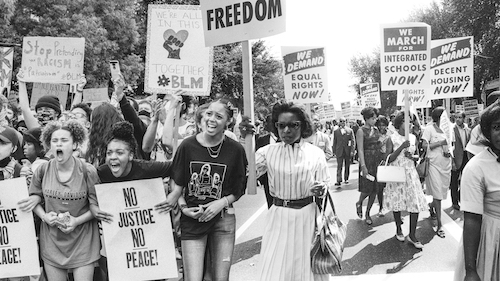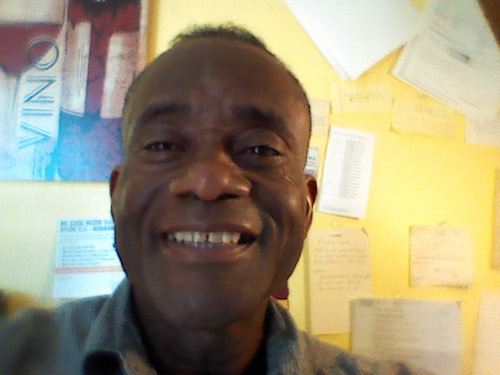And do you see them going in that direction? I mean, calls to defund the police, for example — and that might be an unfortunate slogan for reaching some folks — but if you unpack that, what people are talking about is putting resources into a broader range of health and safety services. That strikes me as much more focused on policy than ideology.
I think that’s true. Being very issue-oriented, rather than ideologically oriented, has the potential to mobilize large numbers of people. Obviously it has — people across the planet are rallying in support of Black Lives Matter. The fact that the movement doesn’t have a singular, central figurehead is good too, because the leadership will tend to be collective. I think the challenge lies when you start looking beyond police brutality issues to a program that addresses systematic racism. If you’re going to attack systematic racism, there are two sides. There is the obvious side where white Americans hold on to racist ideas and practices. But there is also the issue of how it has impacted the Black community internally. The idea of self-hatred, Black-on-Black crime — all of these are manifestations of systemic racism. As academics, we look at this as an issue of colonization. African Americans are a colonized people, and studies show that when people are colonized, they often turn on themselves when they can’t defeat the colonizer. And these are deep, deep issues that obviously transcend the immediate issue of police brutality. Here, I think we need to acknowledge that whites know the white community better than Black people do. So sincere whites need to start teaching other whites about how racism emerged and show the evolution of systematic racism and how it’s impacted the thinking and culture of white America. And African Americans need to do the same thing, since Black people know the Black community better than anyone. Then they can come together to trade notes and see where we go from there.
That’s a really interesting idea. In fact, I feel like one of the threads of the current movement, especially the part that’s taking place online, is that white people are confronting white people in a way they haven’t before. Is that something different about this moment?
You did have some of that in the ‘60s, but it wasn’t extensive. The ‘60s was an era of very radical change compared to the 1950s and there was a lot of tension. Those whites who had made that radical shift, particularly the young people, were not able to consistently approach those who were older and get them to reconsider their views. There was just so much antagonism. So I think what we’re seeing is different. One thing that impresses me is that you have large numbers of whites involved, and from what I’m able to gauge, those whites who are activists in the movement are able to talk with other whites about the issues. The key thing is that it cannot be based on a guilt trip. Race and racial oppression is a very sensitive issue. And many whites who want to be involved often get involved because of a guilt feeling, and it has to be avoided. Their support for the African American Freedom Movement has to be a mature understanding based on information for this to advance to the next level.
I also hope folks today realize that people come into the movement with different degrees of awareness or consciousness. No one can say that their view is a hundred percent correct. You may be able to say you’ve done sufficient study and that you have a good firm grasp of cause and effect when it comes to the issues. If you’ve done that, I think you’re good to go. The important thing is to have an environment where sincere people can grow and mature and build that commitment into something that has substance. That, to me, is the charge of young people today.
It strikes me that one of the old lessons younger generations may be learning now is about the durability of power. Already we’re seeing how broad platforms to reimagine public safety are transforming into modest reforms to, say, ban chokeholds, when they hit Congress. Why do you think America historically has been more comfortable embracing incrementalism than fundamental change?
Well, one of the main functions of government is to provide civic order for its citizens; government does not come into existence to perpetuate change. So the government today is not likely to embrace the kinds of sweeping changes that the protestors are demanding. I hate to say this, but for lack of a better term, the United States has elements of being a “police state.” It is not that across the board, but the government tends to support police officers, so residents will really have to force the issue with politicians, who obviously have a role to play in this.
One of the things about the United States that I can say is that it is a dynamic country rather than a static country. What I mean by that is there is a capacity and a constant interest in change; we have the “change dynamic.” But reform tends to be the major process of change, rather than revolution, as is the case in other countries. A major reason for this is the standard of living in this country is so high, so many people have a lot to lose through revolution. And that is to say, in order for a movement to bring about radical change in this country, it likely first has to be reformist, which the current activism is — and then mature into something that’s more radical.
One other thing on this point: One of the trends I find very interesting is that in the past 20 years, leftists in this country have moved into the Democratic Party. Historically, most of the people in the white left, in particular, had their own parties. But because they were unable to gather a large enough following to win elections, they decided to influence the Democratic Party by having a left wing within it. Bernie Sanders is, of course, the biggest example of this, and he’s now passing on that baton to a younger generation. Getting involved in electoral politics will bring limited, incremental gains, and so today’s activists have to be satisfied with that. But it is one way to pursue change now that is available to them that maybe wasn’t 10 years ago.
Finally, what do you think would be a worthwhile shorter-term achievement of the current wave of activism? And how about something that could grow out of it that could influence change in the longer-term?
Two things for the short term: First, on the police brutality issue, we need to have police officers become more sensitized to their roles as civil servants in the community. If you get the police on your side — if you can get them to listen to you and side with you — that’s a huge step. And it appears like the Black Lives Matter movement is already doing a lot to bring about this kind of consciousness. Number two, you have to institutionalize that by setting up functioning community oversight, so that when things happen like they did this year, citizens have a direct role in reviewing it and deciding what happens next.
Longer term, that’s a tougher one. Personally, I’d like to see a movement of independent educational programs in the white community being launched by activist whites. Again, the goal would not be to browbeat or guilt whites, but to educate people about the foundations of systematic racism. I’m talking about sessions of 20 or 30 people, who, say, read a book on sociology or political science or history and discuss the issues. That’s the kind of deep education that I think has to underlie longer-term solutions, because as those people move into the realms of power, they’ll bring with them a consciousness that guides them toward decisions that actually serve the whole of their communities.








